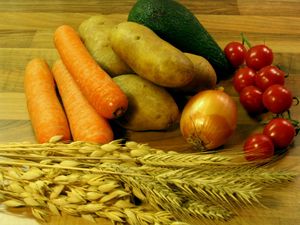Food
The amount of Food for human beings that can be brought from Earth to Mars is limited, and the logistics of a continued food transport for the long term is expensive. Especially an autonomous colony needs it's own food production. Reasons for this are cost reduction and the achievement of independence from Earth. Last but not least, the own food can be of higher quality and fresh, including a natural mix of vitamins and minerals.
Contents
Food that can be brought from Earth
- Several varieties of dehydrated food.
- Natural food that contains large amounts of fat and carbohydrates, such as nuts.
- Concentrated fruit juice.
- Light weight, high energy foods with a long shelf-life.
Local Production Methods
- Vegetable can be grown in greenhouses or on green walls.
- Proteins, fat and carbohydrates can be produced by a biotechnological factory
- In-vitro meat
- Animals, such as chicken or fish, may be raised in sections of greenhouses.
- It must be taken into account that the production of 1 kg meat requires 7 to 16 kg of vegetable matter.[1]
- In addition, it takes 2000 to 3000 litres of water to produce 1 kg of meat, it only takes 100 litres of water to grow 1 kg of grain. Water will be a very valuable commodity on Mars, so the first generation of settlers may well be vegetarian by necessity.
- Growing insects and their larvea (e.g. flour worms) can provide valuable proteins and might consume not too much vegetable mass (compared with cattle).
- Algae
- Some food (possibly genetically modified) may be grown in the Martian atmosphere. Results from the Phoenix lander indicate that some vegetables may be grown in caves safe from radiation.
Big Nate!Good to hear from you! I hope you're keeping well. Thanks for your feceabdk! I'm glad to know that podcasting might just be the medium of most effective communication for Letters' Lounge! Does the podcast remind you of the countless hours I spent in your office?You have my contact information, so anytime you want help just give me a call!Talk to you soon, Big Nate!
Facts and figures
- Sweden: 26260 kg potatoes per hectare [2]
- Sweden: about 6000 kg wheats per hectare [3]
- "Plain boiled potatoes are naturally low in fat and provide 72 kcal/100g (306 KJ/100g)" [4]
- "Wheat flour provides 310 - 340 kcal/100g (1320 - 1450 KJ/100g)"[5]
Open issues
- What sorts of food are required to keep the settlers healthy? We need a nutrition plan on a scientific base.
- How much vegetable is needed to produce 1 kg pork, chicken, rabbit, beef, flour worm, etc.?
- What esculent animal/insect/worm etc. needs the smallest amount of vegetable? The best mass ratio is sought-after. A list would be highly welcome.
- What is known about needed vitamins and minerals?
- Is it possible to make artificial food with an artificial mixture of vitamins and minerals, allowing humans to keep well and fit?







